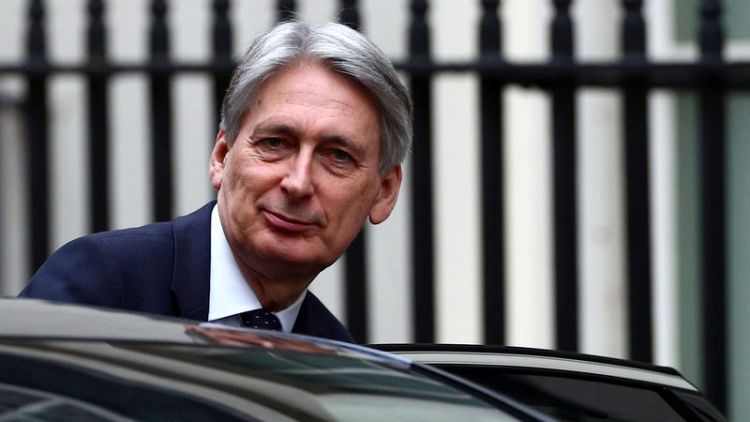LONDON, (Reuters) - Britain's public finances showed a record surplus last month as a surge in income tax payments put Chancellor of the Exchequer Philip Hammond on a strong footing for his final fiscal statement before Brexit.
Britain ran a budget surplus of 14.895 billion pounds in January, the highest since monthly records began in 1993 and above all economists' forecasts in a Reuters poll, the Office for National Statistics (ONS) said on Thursday.
Britain's budget deficit now looks on track to fall to its lowest since 2001/02 at just over 1 percent of national income this financial year, down from nearly 10 percent just after the depths of the global banking crisis in 2009/10.
January is typically a surplus month for Britain's public coffers because of seasonal flows of income tax, and the latest data showed income and capital gains tax receipts up 14 percent, twice their average growth rate earlier in the year.
Borrowing in the first 10 months of the financial year came to 21.2 billion pounds, 47 percent less than at the same point in the 2017/18 tax year and the lowest since the 10 months to January 2001.
For the full year, the government aims to limit borrowing to 25.5 billion pounds, 39 percent less than in 2017/18.
Hammond will give a half-yearly budget update to parliament on March 13, just over two weeks before Britain is due to leave the European Union.
But government budget forecasters predict borrowing will rise during the financial year starting in April as the economy slows and the government faces pressure to increase real-terms spending on areas such as public health.
A disruptive no-deal Brexit would be likely to hurt tax revenues further and boost the need for public spending.
Prime Minister Theresa May has so far failed to win parliament's support for the deal she brokered with Brussels last year. Without a Brexit deal, British importers and exporters face the risk of lengthy customs delays.
Hammond has said he has set aside money to help the economy if it suffers a Brexit shock.
The ONS said Thursday's data showed strong increases for tax revenue on income and capital gains, and also for taxes on corporate profits, a smaller source of government revenue.
However, property transaction tax revenue fell, reflecting a slowing housing market.
Stripping out investment spending, Britain is already running a budget surplus. But lawmakers criticised Hammond earlier this month for appearing to have abandoned an aim to run an outright budget surplus by the middle of the next decade.
(Reporting by David Milliken and William Schomberg; uk.economics@reuters.com; +44 20 7542 7947)



